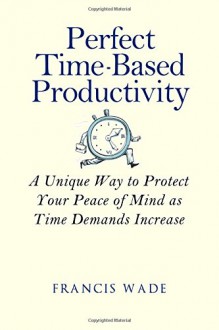Perfect Time-Based Productivity: A unique way to protect your peace of mind as time demands increase
More demands on your time - that's just a fact of modern life. You may be doing the job of more than one person and facing an onslaught of information, only to realize that ubiquitous, 24-7 technology has only made things worse. How do you stay ahead of the expectation that you should be able to...
show more
More demands on your time - that's just a fact of modern life. You may be doing the job of more than one person and facing an onslaught of information, only to realize that ubiquitous, 24-7 technology has only made things worse. How do you stay ahead of the expectation that you should be able to meet all your obligations, old and new? In the face of these increasing pressures, what do you need to do to maintain your peace of mind? This book is primarily written for productive professionals who have already found a way to achieve positive results. They aren't clueless - time is an important concern and they have been able to manage their affairs well enough to get through school, hold a job, keep a family and enjoy life's benefits. However, if you belong to this group, you may share a concern: how can you be successful in the future, given the hot pace of change you see around you every day? Doing more of the same seems an unlikely answer. So does the conventional wisdom around "time management" and the popular tactic of following one-size-fits-all solutions. While the book has lots of specific, practical suggestions for new behaviors, at its heart is a four step approach that preserves and builds on the advances that you, as a professional, have already made in your career: Step 1> Evaluate your current skills against best-in-class standards, discovering strengths and improvement opportunities. Step 2> Set realistic targets for new behaviors that meet your unique, evolving needs. Step 3> Create a personalized plan from these new targets that allow you enough time to succeed, by taking small steps. Step 4> Craft your own habit change support environment. By the end of the book you will have completed these steps many times, giving you an easy way to improve any skill that's important to your peace of mind. To complete these steps effectively, Perfect Time-Based Productivity takes you through a broad range of new ideas based on recent research and case studies in fields such as psychology, business process management, adult learning, brain science and industrial engineering. Part One - You discover the concepts needed to shift from attempting to manage or control time (which is impossible) to managing time demands - the "individual, internal commitments made to complete actions in the future." Once these ideas are understood, you discover that every person manipulates time demands in similar ways, subject to the limits of human capacity. However, your implementation is unique because in this area of life, humans are almost completely self-taught. Part Two - Using a number of forms provided in the book (and available for download) you perform an evaluation of 7 essential skills: Capturing, Emptying, Tossing, Acting Now, Storing, Listing and Scheduling. Each self-evaluation is the precursor to creating a mini-improvement plan which goes into a Master Plan, made up of small steps, that outlines your improvement journey. It's one that will change your habits, practices and rituals at a pace that preserves your peace of mind. Part Three - You'll learn about other advanced skills and perspectives needed to be effective in today's world. For example, Flowing - your capacity to be in the flow state defined by Mihaly Csikszentmihalyi - is an important skill to master given the pressure to multi-task and become distracted. Also, you'll learn why corporations are struggling with time-based productivity: they don't push for the right tools for their employees and have allowed individual effectiveness to become a matter of chance, versus policy. The book closes with additional resources for already-productive professionals such as Type A business-people, fans of productivity improvement, project managers and time advisers. Everyone who picks up this book will learn a new definition of "perfection": To improve is to change; to be perfect is to change often. Winston Churchill.
show less

